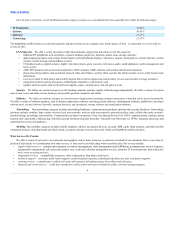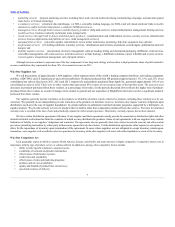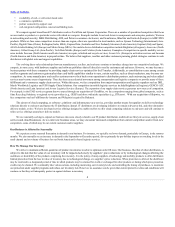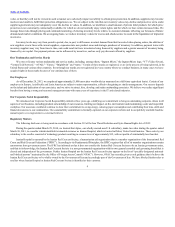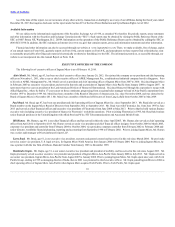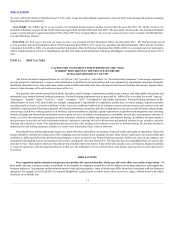Ingram Micro 2013 Annual Report Download - page 16
Download and view the complete annual report
Please find page 16 of the 2013 Ingram Micro annual report below. You can navigate through the pages in the report by either clicking on the pages listed below, or by using the keyword search tool below to find specific information within the annual report.
Table of Contents
we are exposed to credit loss in the event of nonperformance by these counterparties. In addition, our hedging activities may not fully offset any adverse
financial impact resulting from currency variations, which could affect our financial results.
Terminations of a supply or services agreement or a significant change in supplier terms or conditions of sale could negatively affect our
operating margins, revenue or the level of capital required to fund our operations. A significant percentage of our net sales relates to products sold to us
by relatively few suppliers. As a result of such concentration risk, terminations of supply or services agreements, or a significant change in the terms or
conditions of sale from one or more of our more significant partners, or bankruptcy or closure of business by one or more of our more significant partners
could negatively affect our operating margins, revenues or the level of capital required to fund our operations. Our suppliers have the ability to make, and in
the past have made, rapid and significantly adverse changes in their sales terms and conditions, such as reducing the amount of price protection and return
rights as well as reducing the level of purchase discounts and rebates they make available to us. In most cases, we have no guaranteed price or delivery
agreements with suppliers. In certain product categories, such as systems, limited price protection or return rights offered by suppliers may have a bearing on
the amount of product we may be willing to stock. We expect restrictive supplier terms and conditions to continue in the foreseeable future. Our inability to
pass through to our customers the impact of these changes, as well as our failure to develop systems to manage ongoing supplier programs, could cause us to
record inventory write-downs or other losses and could have a negative impact on our gross margins.
We receive purchase discounts and rebates from suppliers based on various factors, including sales or purchase volume, breadth of customers and
achievement of other goals set by the vendors. These purchase discounts and rebates may affect gross margins. Many purchase discounts from suppliers are
based on percentage increases in sales of products. Our operating results could be negatively impacted if these rebates or discounts are reduced or eliminated or
if our vendors significantly increase the complexity of process and costs for us to receive such rebates.
Our ability to obtain particular products or product lines in the required quantities and to fulfill customer orders on a timely basis is critical to our
success. The IT industry experiences significant product supply shortages and customer order backlogs from time to time due to the inability of certain
suppliers to supply certain products on a timely basis. As a result, we have experienced, and may in the future continue to experience, short-term shortages of
specific products, which can in turn have significant impacts on pricing of such products. In addition, suppliers who currently distribute their products
through us may decide to shift to or substantially increase their existing distribution, through other distributors, their own dealer networks, or directly to
resellers or end-users. Suppliers have, from time to time, made efforts to reduce the number of distributors with which they do business. This could result in
more intense competition as distributors strive to secure distribution rights with these vendors, which could have an adverse effect on our operating results. If
suppliers are not able to provide us with an adequate supply of products to fulfill our customer orders on a timely basis or we cannot otherwise obtain
particular products or a product line or suppliers substantially increase their existing distribution through other distributors, their own dealer networks, or
directly to resellers, our reputation, sales and profitability may suffer.
Substantial defaults by our customers or the loss of significant customers could have a negative impact on our business, results of
operations, financial condition or liquidity. As is customary in many industries, we extend credit to our customers for a significant portion of our net sales.
Customers have a period of time, generally 30 to 45 days after date of invoice, to make payment. We are subject to the risk that our customers will not pay for
the products they have purchased. The risk that we may be unable to collect on receivables may increase if our customers experience decreases in demand for
their products and services or otherwise become less stable, due to adverse economic conditions. If there is a substantial deterioration in the collectability of our
receivables or if we cannot obtain credit insurance at reasonable rates, are unable to collect under existing credit insurance policies, or fail to take other actions
to adequately mitigate such credit risk, our earnings, cash flows and our ability to utilize receivable-based financing could deteriorate. In addition, our
customers do not have an obligation to make purchases from us. In the event a significant customer decides to make its purchases from another distributor,
experiences a significant change in demand from its own customer base, becomes financially unstable, or is acquired by another company, our revenues, and
our ability to access rebates from vendors may be negatively impacted, resulting in an adverse effect on our business or results of operations.
Changes in, or interpretations of, tax rules and regulations, changes in mix of our business amongst different tax jurisdictions, and
deterioration of the performance of our business may adversely affect our effective income tax rates or operating margins and we may be
required to pay additional taxes and/or tax assessments, as well as record valuation allowances relating to our deferred tax assets. We are subject
to both income and transaction-based taxes in substantially all countries and jurisdictions in which we operate, which are complex. Changes to tax regulations
or to their interpretation or application by governments could adversely affect our future earnings and cash flows. Our effective income tax rate in the future
could be adversely affected by changes in the mix of earnings in countries with differing statutory tax rates, changes in the valuation of deferred tax assets and
liabilities, changes to our operating structure, changes in tax laws and the discovery of new information in the course of our tax return preparation process.
16


